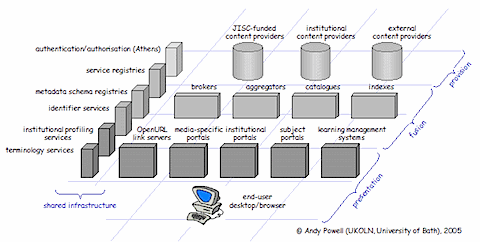One of the key conclusions emerging from our ongoing consultation with some of those who have been involved with the JISC Information Environment (JISC IE) since its early days is that the emphasis on interoperability through open standards was one of the key drivers which gave the programme direction and momentum. Giving focus to this emphasis on open standards was a web document, JISC Information Environment Technical Standards, which introduced itself thus:
What need is there for unique identifiers?
Put in relatively non-technical language, there is an increasing concern in information science in general to uniquely identify different things, organisations or people that could otherwise be confused, whether on the Internet or in the physical world. In technical terms, these are all referred to as resources (even if people might find it vaguely demeaning in normal language to be considered as such).





